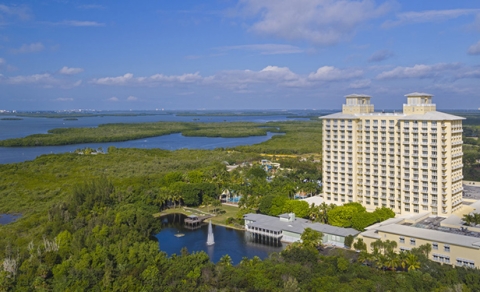Florida’s Red Tide Showing Little Impact on Meetings and Events

On Aug. 13, Governor Rick Smith declared a state of emergency in seven counties along the Florida Gulf Coast, and the red tide continues to have a negative impact on the state’s shores and beaches. The toxic algae bloom is responsible for a drop in tourism that many local businesses worry will continue.
The red tide is a natural phenomenon that has been documented since the 1500s. However, this most recent occurrence has been particularly troublesome. The harmful algae bloom (the term that scientists prefer) emits toxic gasses that have killed a vast quantity of marine life. These gasses and ingestion of contaminated seafood can also cause respiratory, gastrointestinal and neurological disorders in humans.
As unpleasant as the red tide may be, according to the coastal venues and destination management organizations contacted for this article, it has had little impact on meetings and events.
“Our coastal location is buffered from the effects of red tide in the Gulf of Mexico by a chain of barrier islands and Estero Bay,” said Brian Kramer, general manager of the Hyatt Regency Coconut Point Resort & Spa.“Thankfully, we have had no group cancellations the entire summer.”
Santiago C. Corrada, president and CEO of Visit Tampa Bay, said that because Tampa Bay isn’t a beach destination per se, they have not seen any impact from the red tide. However, he expressed general concern for the health and welfare of the state and its tourism.
“Obviously, as a vacation destination, anything that affects the Florida environment is something we should all be concerned about, even if it’s from a perception perspective,” Corrada said. “We will continue to monitor the situation and hope the situation improves, as clean water and outdoor areas are vital to the state’s tourism efforts.”
Meanwhile, the CVBs along the coast are doing what they can to help keep meeting planners and attendees informed of the situation.
Virginia Haley, president of Visit Sarasota, said that the CVB is actively working with VISIT FLORIDA and other entities to help the tourism industry during and after the red tide episode.
“Visit Sarasota continues to direct meeting planners and visitors to VisitBeaches.org to get the most up-to-date information so they can make informed decisions for their clients,” Haley said. “Fortunately, most of our meetings hotels have continued to hold their meetings.”
According to the Florida Fish and Wildlife Conservation Commission (FWC), reports of fish kills were received for multiple locations in Pinellas, Manatee, Sarasota and Lee counties within the past week, and respiratory irritation was reported in Manatee, Sarasota and Lee counties.
Until the FWC advises it is safe, people should avoid spending significant amounts of time on the beaches or swimming in these waters and refrain from eating any seafood, particularly shellfish, from these areas. It is recommended that outdoor beach and water activities in areas affected by the red tide be canceled. This is another area where the local CVBs can help groups change existing plans or make new ones.
“We are able to provide visitors and meeting planners with full itineraries and activities that are away from the beaches and bay if needed, as well as provide incentives for future meetings,” said Haley.
On Aug. 17, VISIT FLORIDA launched two programs to assist local tourism development boards in counties adversely affected by the red tide. The Tourism Recovery Grant Program for Red Tide and Red Tide Recovery Marketing Program are designed to assist each affected county with marketing their destination once the harmful algae bloom has subsided.
VISIT FLORIDA will also do extensive marketing when Southwest Florida’s beaches are back to normal and ready to welcome visitors.
“Florida’s economy is fueled by travel and tourism and it’s VISIT FLORIDA's job to protect our industry,” said Ken Lawson, president & CEO of VISIT FLORIDA. “These programs will allow our destinations to show visitors that Florida is ready to welcome visitors back to its world-renowned beaches in Southwest Florida.”
For information on the status and location of the red tide, visit the Florida Fish and Wildlife Conservation Commission website.
Don't miss any event-related news: sign up for our weekly e-Newsletter HERE & engage with us on Twitter, Facebook, LinkedIn & Instagram!


Add new comment